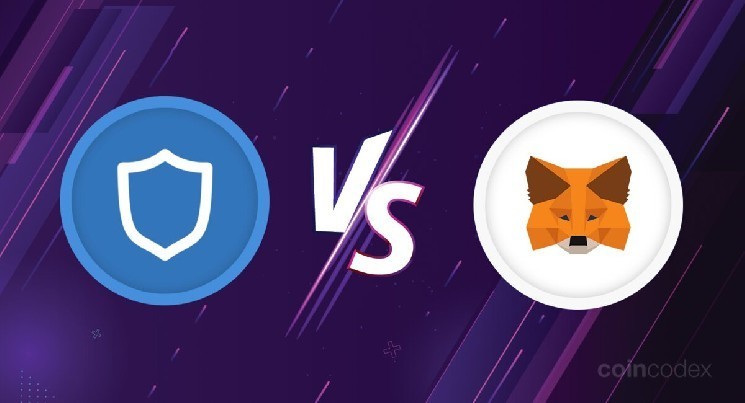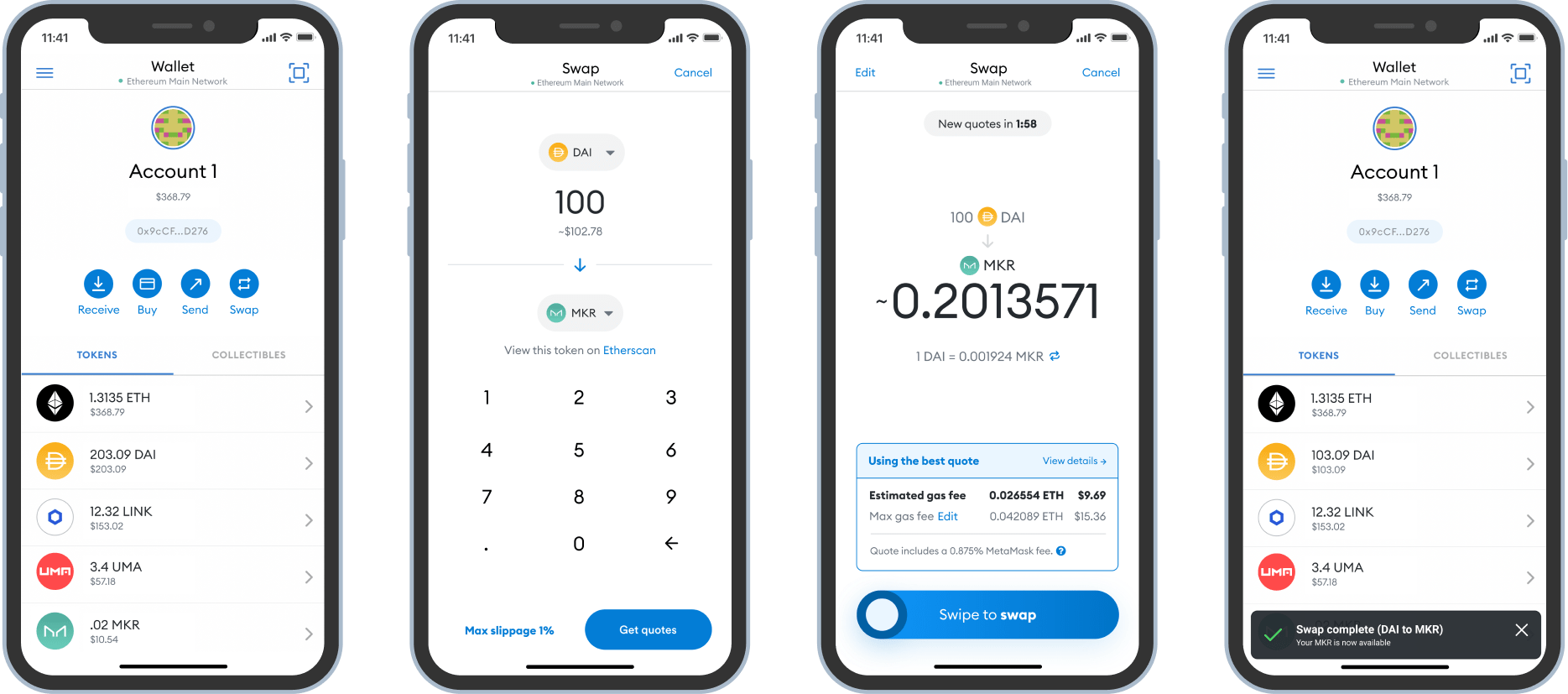Trust Wallet vs MetaMask: Which Wallet Should You Use?

Trust Wallet is best for users who are searching for a simple-to-use wallet that supports Bitcoin, Ethereum, and dozens of other networks. MetaMask supports Ethereum and EVM-compatible chains only but has some advanced customization options that Trust Wallet lacks.
Trust Wallet and MetaMask are two popular cryptocurrency wallets that allow users to store and manage their digital assets, as well as interact with decentralized applications (dApps) built on various blockchain networks. However, they have some key differences that may affect your choice depending on your needs and preferences.
In this article, we will compare Trust Wallet and MetaMask in terms of their features, supported networks, security, and user experience. We’ve used both wallets extensively, both as a storage option and as a way to interact with dApps.
Trust Wallet vs MetaMask: A side-by-side comparison
Before we dive into the complete comparison between the two popular crypto wallets, you can check the main differences (and many similarities) between Trust Wallet vs MetaMask in the table below.
| Trust Wallet | MetaMask | |
|---|---|---|
| Wallet Type | Hot wallet Non-custodial |
Hot wallet Non-custodial |
| Supported Browsers | Chrome, Brave, Edge, Opera | Chrome, Firefox, Brave, Edger, Opera |
| Mobile App | Yes (Android & iOS) | Yes (Android & iOS) |
| Security | 12-word secret phrase 2FA Password and PIN |
12-secret phrase 2FA Password Phishing Protection Encrypted Storage |
| Staking Support | Yes | Yes |
| Supported Assets | Assets across Bitcoin and 50+ other chains | Coins and tokens on EVM-compatible chains |
| Supported Networks | Over 50 blockchains | Ethereum & EVM-compatible networks |
| NFT Support | Yes | Yes |
| DApp support | Yes (integrated DApp browser) | Yes |
| Fiat Onboarding | Yes | Yes |
| Native Token | TWT | / |
Features
Trust Wallet is a hot wallet browser extension and mobile app that supports over 53 blockchain networks and more than 9 million digital assets, including Bitcoin, Ethereum, BNB, NFTs, and many others. Users can perform basic transactions and also access DApps through the built-in browser or the WalletConnect feature. Trust Wallet also offers features such as staking, swapping, NFT support, and a fiat gateway.
Trust Wallet has a native token called Trust Wallet Token (TWT) that acts as a governance token. In addition, it is used for submitting Pull Requests to the Trust Wallet Asset repository and for affiliate and bounty rewards.
MetaMask is a browser extension and mobile app that supports the Ethereum blockchain and its associated tokens, such as ERC-20 and ERC-721. Users can also connect to other Ethereum Virtual Machine (EVM) compatible networks, such as BNB Smart Chain, Polygon, and Arbitrum. MetaMask allows users to send and receive transactions and use DApps through the web browser or the mobile app. MetaMask also has features such as swapping, hardware wallet integration, and custom RPC support.
Both Trust Wallet and MetaMask support fiat onboarding via third-party payment processors, allowing users to buy cryptocurrency with their local currency right from their wallets.
Mobile wallet apps

Trust Wallet makes sending and receiving crypto on your mobile device easy by using a QR code.
The Trust Wallet mobile application has many of the features of its internet browser counterpart. It supports DEXs like Binance DEX, Uniswap, and PancakeSwap. It also allows users to use biometric sensors (Face ID, fingerprint scanner, etc.) on their devices as an added layer of security and authentication. There is coins and networks parity between the desktop version and the mobile version of Trust Wallet, as both version support virtually the same chains and assets.
The MetaMask mobile app is available on both iOS and Android mobile devices, allowing users to buy, send, and trade their digital assets. In addition, the wallet can be connected to supported services for trading, borrowing, gaming, and other use cases. Like its desktop counterpart, the mobile version of MetaMask allows you to control what information you share with each product and service you connect to.
Supported coins and networks
Trust Wallet supports multiple cryptocurrency networks and assets, including Bitcoin, Ethereum, BNB, Litecoin, Dogecoin, Ripple, Tron, Solana, Cardano, Polkadot, Avalanche, Cosmos, Tezos, and many more. Users can easily switch between different networks and view their balances in one place. Trust Wallet also supports cross-chain compatibility through the Binance Bridge feature.

You can easily swap between various cryptocurrencies with your MetaMask wallet.
MetaMask is primarily an Ethereum wallet that supports the Ethereum blockchain and its smart contract tokens. However, users can also add custom networks that are EVM-compatible by following a few easy steps (for example, adding the BSC testnet to get free BNB). Some of the popular EVM networks that MetaMask supports are BNB Smart Chain, Polygon, Arbitrum, Optimism, xDai, and Fantom. In addition, MetaMask supports Layer 2 solutions that aim to improve scalability and reduce fees on Ethereum. Unfortunately, MetaMask doesn’t support Bitcoin natively – instead, you complement your MetaMask with one of the Bitcoin Lighting wallets.
Security
Trust Wallet is a non-custodial wallet that gives users full control over their private keys and funds. Users can create a backup phrase that can be used to restore their wallet on any device. Trust Wallet also has security features such as biometric authentication, PIN code protection, and encrypted storage. According to the company, Trust Wallet does not collect any personal information from users and doesn’t sell its users’ personal information to others.

Both MetaMask and Trust Wallet feature a 12-word seed phrase that allows you to back up access to your crypto assets.
MetaMask is also a non-custodial wallet that allows users to manage their own private keys and funds. Users can create a password and a seed phrase that can be used to access their wallet on different devices or browsers. MetaMask also boasts security features like phishing protection, secure login, and encrypted storage. MetaMask does not collect your IP address or share it with third parties for profit, per the official statement.
User experience
Trust Wallet has a user-friendly interface that makes it easy for beginners and experts alike to use the wallet. Users can view their portfolio value in their preferred currency, track their transaction history, and manage multiple wallets with different addresses. Trust Wallet also has a simple and intuitive DApp browser that allows users to explore various DApps without leaving the app.
MetaMask has a simple and sleek interface that integrates seamlessly with the web browser. Users can view their account balance in ETH or fiat currency, monitor their transaction history, and manage multiple accounts with different addresses. Moreover, MetaMask has a convenient feature that allows users to quickly check which DApps are connected to their wallet account, and quickly terminate the connection if necessary. It is worth mentioning that MetaMask is a bit more challenging to use for a novice user than Trust Wallet, especially when adding custom networks.
The bottom line: Both MetaMask and Trust Wallet are great crypto wallet products
Trust Wallet and MetaMask are both excellent choices for cryptocurrency users who want to store and manage their digital assets conveniently. However, they have some differences that may suit different needs and preferences.
Trust Wallet offers more diversity in supported networks, while MetaMask is limited to Ethereum and other EVM networks. Trust Wallet has a mobile-only app, while MetaMask has a browser extension and a mobile app. Trust Wallet has more features such as staking, NFT support, and fiat gateway while MetaMask has fewer features but more customization options.
Ultimately, the best wallet for you depends on your personal goals and preferences. You may want to use both wallets for different purposes or choose one that meets your specific needs. However, if you seeking the highest level of protection for your crypto holdings, you should consider using crypto hardware wallets. Devices by Ledger or Trezor store your keys offline, making it much more difficult for malicious actors to gain access to your crypto funds.







 Bitcoin
Bitcoin  Ethereum
Ethereum  Tether
Tether  USDC
USDC  Dogecoin
Dogecoin  Cardano
Cardano  TRON
TRON  Bitcoin Cash
Bitcoin Cash  Chainlink
Chainlink  Polygon
Polygon  Litecoin
Litecoin  LEO Token
LEO Token  Dai
Dai  Ethereum Classic
Ethereum Classic  Hedera
Hedera  Stacks
Stacks  Cronos
Cronos  Stellar
Stellar  Cosmos Hub
Cosmos Hub  OKB
OKB  Maker
Maker  Theta Network
Theta Network  Monero
Monero  Algorand
Algorand  NEO
NEO  Gate
Gate  Tezos
Tezos  KuCoin
KuCoin  EOS
EOS  Synthetix Network
Synthetix Network  IOTA
IOTA  Bitcoin Gold
Bitcoin Gold  Tether Gold
Tether Gold  TrueUSD
TrueUSD  Enjin Coin
Enjin Coin  Zilliqa
Zilliqa  Ravencoin
Ravencoin  Holo
Holo  0x Protocol
0x Protocol  Siacoin
Siacoin  Qtum
Qtum  Basic Attention
Basic Attention  Dash
Dash  Zcash
Zcash  NEM
NEM  Decred
Decred  Ontology
Ontology  Lisk
Lisk  Waves
Waves  DigiByte
DigiByte  Status
Status  Numeraire
Numeraire  Nano
Nano  Pax Dollar
Pax Dollar  Hive
Hive  Steem
Steem  Huobi
Huobi  OMG Network
OMG Network  BUSD
BUSD  Ren
Ren  Bytom
Bytom  Bitcoin Diamond
Bitcoin Diamond  HUSD
HUSD  Kyber Network Crystal Legacy
Kyber Network Crystal Legacy  Energi
Energi  Augur
Augur